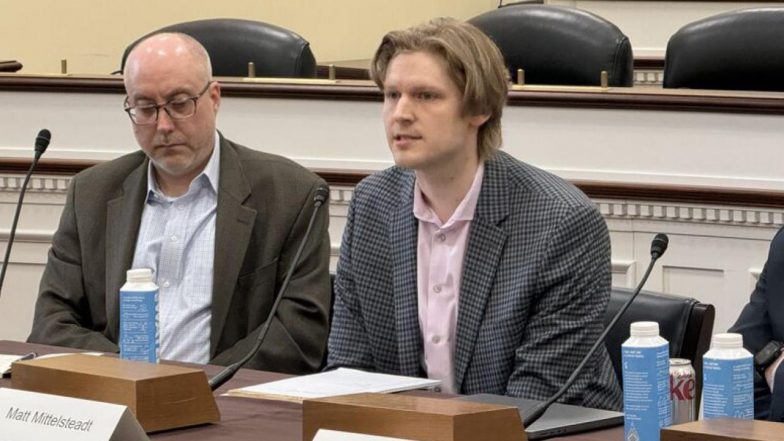Summary
Matthew Mittelsteadt is a technology policy research fellow at the Cato Institute. His research focuses on the intersection of policy, cybersecurity, and emerging technologies including artificial intelligence and quantum computing. Matthew’s work concentrates on ensuring emerging tech adoption and innovation, enabling robust cybersecurity, and preserving tech market access and international trade. His work has appeared in The Hill, National Review, Noema Magazine and his Substack Digital Spirits.
Prior to joining Cato, Matthew worked as an AI policy fellow at both the Mercatus Center at George Mason University and Syracuse Law School. In the private sector, he developed his tech expertise as a healthcare IT professional. He holds a BA in economics and Russian Studies from St. Olaf College, an MPA from Syracuse University, and an MS in cybersecurity from New York University.
Competitive Enterprise Institute – 08/02/2024 (33:44)
February 8th, 2024 – This week we cover Elon Musk’s controversial pay package, protecting children online, and the Biden administration’s slamming the breaks on new natural gas projects. Our interview this week is with Matt Mittelsteadt, a research fellow at the Mercatus Center at George Mason University.
We talk about artificial intelligence computing applications, what you can do with them, and how the government wants to regulate them. Free the Economy is produced and hosted by Richard Morrison and edited and co-produced by Ryan Kracinski.
OnAir Post: Matthew Mittelsteadt
News
By now, most have heard of Deepseek, the Chinese startup whose namesake AI model surprised the American tech sector with state-of-the-art capabilities delivered at a fraction of U.S. costs.
For those in Washington concerned about potential geostrategic risks of China’s rising tech sector, anxiety was swift and predictable. Since Deepseek’s release, some have fretted that the model’s rock bottom prices might undercut the American market. Meanwhile others have voiced valid data security issues. It’s been noted all user conversations are stored in China and that application code enables direct communication to government controlled servers.
Conclusion
Deepseek and other Chinese AI technologies unquestionably merit scrutiny and skepticism given the geopolitical tensions and conflict of values. Still, any catch-all ban would sacrifice not only general freedom of use, but crucial market dynamism, innovation opportunities, and cybersecurity advantages. By pursuing a measured approach that prioritizes informed use, app store curation and when needed, narrowly scoped regulation, the United States can maintain the technological openness key to both security, and global leadership.
Digital Spirits, – January 22, 2025
Can AI agents solve our digital interoperability problem?
At January’s Consumer Electronics Show, NVIDIA CEO Jensen Huang boldly proclaimed, “the Age of AI agentics is here.” Just days before, OpenAI’s Sam Altman echoed the chipmaker, blogging “We [OpenAI] believe that, in 2025, we may see the first AI agents “join the workforce” and materially change the output of companies.” AI agents are back in vogue.
For the non-technical, “agents” or “agentic AI” refers to AI equipped with not only intelligence, but the ability to autonomously solve complex, multi-step problems. In short, very smart bots.
For years there have been attempts to create workable agents, yet hype has always outpaced reality. Following the release of ChatGPT came a boom of excitement, yielding frameworks like babyAGI, which were unreliable and used tech that failed often. Today, products, such as Salesforce’s Agentforce and Google’s Agentspace, offer modest improvements enabling agents to field customer service queries and automate business tasks. Still, they only work in highly structured environments and are limited to preapproved tasks.
About
Bio
 Technology Policy Research Fellow
Technology Policy Research Fellow
Full-timeCato Institute
Feb 2025 – Present · 2 mos · 2 mosWashington, District of Columbia, United States · On-siteWashington, District of Columbia, United States ·
On-site: Researching a liberal approach to AI and cybersecurity policy.
Research Fellow Mercatus Center at George Mason University
Full-time Mercatus Center at George Mason University · Full-timeJun 2022 – Present
Scholar for Mercatus’ AI Progress Project
Concentrating on trade, cybersecurity, and the rapid yet responsible diffusion of AI technology.Scholar for Mercatus’ AI Progress Project. Concentrating on trade, cybersecurity, and the rapid yet responsible diffusion of AI technology.
Source: LInkedIn
Web Links
Videos
Understanding AI with Matthew Mittelsteadt
(33:44)
By: Competitive Enterprise Institute
February 8th, 2024 – This week we cover Elon Musk’s controversial pay package, protecting children online, and the Biden administration’s slamming the breaks on new natural gas projects. Our interview this week is with Matt Mittelsteadt, a research fellow at the Mercatus Center at George Mason University.
We talk about artificial intelligence computing applications, what you can do with them, and how the government wants to regulate them. Free the Economy is produced and hosted by Richard Morrison and edited and co-produced by Ryan Kracinski.
Research Papers
Artificial Intelligence: An Introduction for Policymakers, Revised Edition
Source: Mercatus
Artificial intelligence (AI) will have a huge impact on the economy. To ensure the effect is a net positive, policymakers need to understand AI at a deeper level to shape a governance regime that maximizes the social benefits of AI and mitigates its risks. In this paper, Matthew G. Mittelsteadt introduces the basic concepts in AI system design and surveys the core technologies that it comprises.
After a Decade of Limited-Purpose AI, an AI Paradigm Shift
The technology is now catching pace with expectations, thanks to large-scale systems trained on broad sets of data that can be easily adapted to a wide range of practical applications. As a result, AI is being applied everywhere from the arts and linguistics to chemistry and computer coding.
Just as previous general-purpose technologies such as electricity transformed society, AI has the potential to revolutionize the entire economic system. And just as policymakers need a working knowledge of economics, they need a working understanding of AI. Why? Because AI is likely to affect all policy domains.
AI Has Little in the Way of Associated Law or Policy
Existing laws treat AI in a general sense; they do not focus on specific applications. Yet many of AI’s benefits, effects, and issues can be understood only in terms of their specific applications and implementations.
Key Takeaway
The sudden explosion in AI progress is adding pressure on policymakers to understand AI in greater depth. This paper explains how the technology works. Along the way, it equips readers with key terms, fundamental concepts, and a toolbox of knowledge that should be supplemented with application-specific expertise.
Articles
The Key To Winning The Global AI Race
Source: Noema Magazine
It’s essential to ensure that AI is shared beyond the leading labs to other firms, schools and even the government itself.
In times of technological tumult, great powers rise and fall. In the past, it was not just leading in the cutting-edge technologies that proved critical for national advancement; the nations that spread the benefits of the technologies most effectively, rather than innovated first, have been able to grow faster over time and ultimately define the trajectory of their era.
The age of AI may prove to be another of these moments. Alongside dramatic societal and economic implications, AI could drive differences in national trajectories. Facilitating AI’s diffusion will be key to national competitiveness for the coming decades.
Alongside supporting frontier research, American policymakers should do their utmost to ensure that not just leading-edge labs, but also firms, schools and government bureaucracies themselves are able to make the most out of AI.
For AI national security, improve but don’t isolate cyber infrastructure
Source: The Hill
Perhaps the most powerful undercurrent to Washington’s drive to adjust to AI are fears of China’s powerful AI sector.
Increasingly, Congress’ energy is directed towards AI export controls — specifically through the House’s bipartisan ENFORCE Act. Introduced in May, it would grant the Department of Commerce authority to control exports of AI system software, on top of preexisting control over AI hardware.
National security fears are spurring the conversation, with cybersecurity receiving specific attention. Foreign Affairs Committee ranking member Raja Krishnamoorthi said: “Without action, there is a grave possibility that a future cyberattack on the American homeland could be enabled by AI technologies.”
While I share these concerns, the proposal might inadvertently bind domestic and international security workers and undermine comprehensive cyber defense efforts.


